

The Balancing Act of Screen Time (Long Version) The post first appeared on Edutopia.

However, they have a 1,000 word count, and I had a lot to say. If you would rather read the abridged version (978 words instead of the 1,700+ here), then check it out. “Television rots your brain.” I remember hearing that frequently as a child. In a similar vein, video games turn your mind to mush and staring at a screen for too long potentially makes you a zombie. Particularly when working with elementary teachers, I frequently hear concerns about bringing technology into the classroom. A Great Conversation On The Technology Concerns Of Parents Regarding 1:1. As I was playing catchup on my blog reading from the last couple of weeks, I came across a great post from Scott McLeod on the topic of parents choosing to opt out of their students having a device in a 1:1 setting.
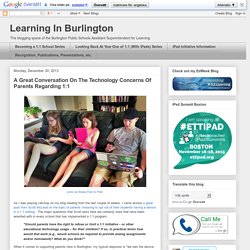
The major questions that Scott asks here are certainly ones that have been wrestled with in every school that has implemented a 1:1 program: "Should parents have the right to refuse or limit a 1:1 initiative – or other educational technology usage – for their children? If so, in practical terms how would that work (e.g., would schools be required to provide analog assignments and/or homework)? The Impact Of Technology On Curiosity. The Impact of Technology on Curiosity by Terry Heick Curiosity is the “complex feeling and cognition that accompanies a desire to learn what is unknown,” according to Min Jeong Kang and fellow researchers in a 2009 study.
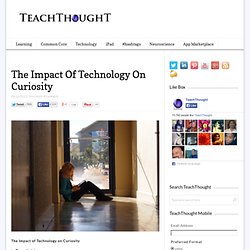
Neurological research here focused on, among other areas, the difference in neural activity when answers are presented, and when questions are presented for both high-curiosity and low-curiosity questions. What they found (in addition to dilated pupils when answers to questions with high curiosity levels were revealed), was revealing: the “desired level of knowledge increases sharply with a small increase in knowledge, so that the gap between this desired level and the actual knowledge grows.” (Kang, et. al 2009). This idea—the proportional relationship between knowing and wanting to know–is the foundation of what is known as the information-gap theory.
How Much Knowledge is Enough? Workplace Distractions: Here's Why You Won't Finish This Article. In the few minutes it takes to read this article, chances are you'll pause to check your phone, answer a text, switch to your desktop to read an email from the boss's assistant, or glance at the Facebook or Twitter messages popping up in the corner of your screen.
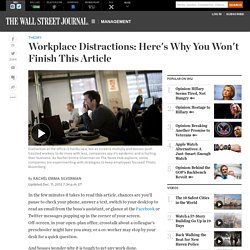
Off-screen, in your open-plan office, crosstalk about a colleague's preschooler might lure you away, or a co-worker may stop by your desk for a quick question. And bosses wonder why it is tough to get any work done. Distraction at the office is hardly new, but as screens multiply and managers push frazzled workers to do more with less, companies say the problem is worsening and is affecting business. While some firms make noises about workers wasting time on the Web, companies are realizing the problem is partly their own fault. Even though digital technology has led to significant productivity increases, the modern workday seems custom-built to destroy individual focus. Part of the solution for Mr.
Mr. Ms. 'The Shallows': This Is Your Brain Online. Distraction. Growing Up Digital, Wired for Distraction. There Are Always a Million Distractions. Here's How to Silence the Noise and Pay Attention. This story first appeared in the September 2014 issue of Entrepreneur.
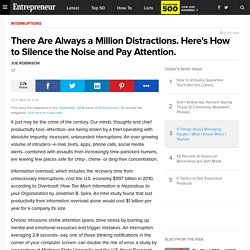
To receive the magazine, click here to subscribe. 3 Reasons You Should Let Yourself Get Distracted. Sir Isaac Newton wasn’t in his laboratory when he discovered the law of universal gravitation.
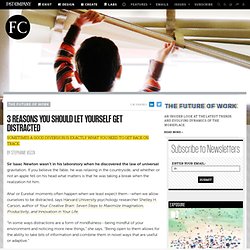
If you believe the fable, he was relaxing in the countryside, and whether or not an apple fell on his head what matters is that he was taking a break when the realization hit him. Aha! Or Eureka! Moments often happen when we least expect them--when we allow ourselves to be distracted, says Harvard University psychology researcher Shelley H. Carson, author of Your Creative Brain: Seven Steps to Maximize Imagination, Productivity, and Innovation in Your Life.
The Benefits of Distraction and Overstimulation. I.
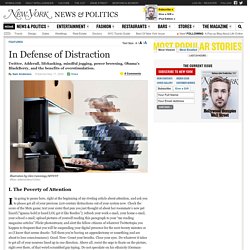
The Poverty of Attention I’m going to pause here, right at the beginning of my riveting article about attention, and ask you to please get all of your precious 21st-century distractions out of your system now. Check the score of the Mets game; text your sister that pun you just thought of about her roommate’s new pet lizard (“iguana hold yr hand LOL get it like Beatles”); refresh your work e-mail, your home e-mail, your school e-mail; upload pictures of yourself reading this paragraph to your “me reading magazine articles” Flickr photostream; and alert the fellow citizens of whatever Twittertopia you happen to frequent that you will be suspending your digital presence for the next twenty minutes or so (I know that seems drastic: Tell them you’re having an appendectomy or something and are about to lose consciousness).